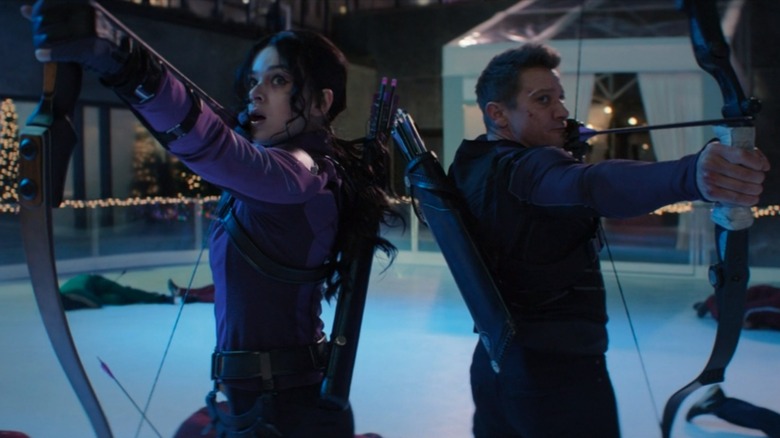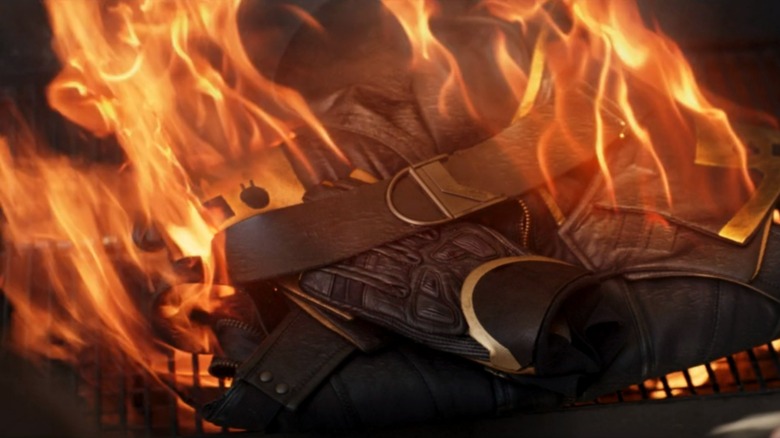How Hawkeye Finally Gave Clint Barton Closure
Once Marvel Studios added Disney+ streaming to its storytelling arsenal, fans were quick to recognize the sheer potential of giving main characters who otherwise received the short end of the stick a longer, more extended spotlight than the movies would otherwise allow. Wanda Maximoff (Elizabeth Olsen) and Vision (Paul Bettany), though embodying popular characters who have made their mark on the MCU already, seemed like an ideal example of finally allowing viewers to actually get to know these heroes through "WandaVision." Similarly, "The Falcon and the Winter Soldier" benefited from the ability to spend several hours of story on Sam Wilson (Anthony Mackie) struggling to come to terms with the weight of the Captain America mantle. But it's safe to say that few viewers would have put Clint Barton's Hawkeye (Jeremy Renner) at the top of the list of Marvel superheroes who needed further exploration in a limited series.
Then again, maybe that underdog status is exactly why Disney+ proved to be such a perfect fit for the underpowered Avenger. Overall, the films neglected to give Clint Barton any sort of inner life ("Avengers: Age of Ultron" excluded), but last night's series finale finally completed Hawkeye's transformation from a punchline to a full-fledged character in his own right. The show's greatest strength was its commitment to following through on a satisfying emotional journey that may have been light on grand, shared universe connections, but ultimately proved to be strong in genuine character work. Here's how "Hawkeye" did all that and more by giving Clint Barton the closure he needed all along.
A Christmas Miracle
As a consequence of taking place in the MCU, the otherwise street-level "Hawkeye" needed to address some of the loose ends leftover from the Marvel movies — namely, Clint Barton's murder spree as Ronin in the wake of his family's dusting at the hands of Thanos, and the self-sacrifice of Natasha Romanoff (Scarlett Johansson) in "Avengers: Endgame" that has haunted him ever since. Though the appearance of Florence Pugh's Yelena Belova could've easily felt like little more than an obligatory, distracting cameo to make this year's "Black Widow" feel more relevant, her and Hawkeye's shared connection with Natasha gives one particular scene in the finale the emotional boost it needed to stand out as a clear highlight of the entire series.
Though the actual beat-by-beat mechanics of how Yelena comes to the mistaken conclusion that Clint is responsible for Natasha's death is a little strained (it takes her until the finale to even bother asking what actually happened!), "Hawkeye" leverages his residual guilt for maximum impact. The final confrontation between Yelena and Clint doesn't hold back on the punches thrown, but one gets the sense that Clint willingly accepts the damage he takes as punishment for his indirect role in her death. "I fought her for it, but she was better than me," he ruefully admits to Yelena when explaining why he couldn't stop her from sacrificing herself. It takes a nifty bit of retconning to finally break through to the vengeful Yelena, however, as he reveals that he's aware of Natasha's past history with her "sister" and, essentially, all the events portrayed in "Black Widow."
When they finally reconcile over their equal love for Natasha, it's a much-needed blast of hope for a character otherwise lacking in it. The early episodes of "Hawkeye" paint a picture of a tired, worn-out hero who alternately receives too much credit for saving the world and not nearly enough. Here, Clint is finally allowed to make peace with himself through Yelena's tacit forgiveness. "Hawkeye" is by far Marvel's lowest-stakes story, but it earns its place in MCU canon by giving its most overlooked hero a long-overdue sense of wholeness.
Ghosts of Christmas Past
In "Hawkeye," Clint Barton's struggle to come to terms with Natasha's death only makes up half of his inner conflict — the other major source of guilt revolves around his dark past as the murderous Ronin at the bleakest low point in his life. This leads to his early brushes with Maya Lopez (Alaqua Cox), who is out for her own revenge over Ronin killing her father. Over the course of the series, this reckoning with Clint's dark past perfectly lines up with Kate Bishop's journey to figure out what kind of hero she wants to be. The idea of what makes a good hero hangs heavy over the events of "Hawkeye," culminating with Kate's mother Eleanor (Vera Farmiga) bitterly spitting back at her daughter in the finale, "Is this what heroes do?" when she's arrested for her connections to Kingpin and her plot to murder Clint.
That's why it's such a perfect ending note for Clint to offer Kate the opportunity to light his Ronin outfit on fire and permanently remove its symbolism from his life. Yes, it was always incredibly silly for "Endgame" to let Clint off the hook so easily despite slaughtering countless criminals across the world, but "Hawkeye" makes the most of this by taking the time to really dig into Hawkeye's insecurities and personal failings. There's no undoing the wrongs of the past, but both Yelena and Kate give him the opportunity to make a better path forward ... or even to step back entirely and let the younger generation of heroes take over for him, depending on Marvel's plans for the future. Either way, "Hawkeye" fully earned the catharsis of burning his Ronin outfit and putting its two main leads in a brighter place than when they started the series. By giving Clint a healthy and satisfying sense of closure, "Hawkeye" becomes — almost by default — Marvel's best and most complete Disney+ series yet.


